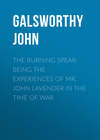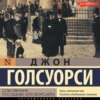Czytaj książkę: «The Burning Spear: Being the Experiences of Mr. John Lavender in the Time of War»
“With a heart of furious fancies,
Whereof I am commander,
With a burning spear and a horse of air
In the wilderness I wander;
With a night of ghosts and shadows
I summoned am to tourney
Ten leagues beyond the wide world’s end
For me it is no journey.”
TOM O’BEDLAM
I
THE HERO
In the year – there dwelt on Hampstead Heath a small thin gentleman of fifty-eight, gentle disposition, and independent means, whose wits had become somewhat addled from reading the writings and speeches of public men. The castle which, like every Englishman, he inhabited was embedded in lilac bushes and laburnums, and was attached to another castle, embedded, in deference to our national dislike of uniformity, in acacias and laurustinus. Our gentleman, whose name was John Lavender, had until the days of the Great War passed one of those curious existences are sometimes to be met with, in doing harm to nobody. He had been brought up to the Bar, but like most barristers had never practised, and had spent his time among animals and the wisdom of the past. At the period in which this record opens he owned a young female sheep-dog called Blink, with beautiful eyes obscured by hair; and was attended to by a thin and energetic housekeeper, in his estimation above all weakness, whose name was Marian Petty, and by her husband, his chauffeur, whose name was Joe.
It was the ambition of our hero to be, like all public men, without fear and without reproach. He drank not, abstained from fleshly intercourse, and habitually spoke the truth. His face was thin, high cheek-boned, and not unpleasing, with one loose eyebrow over which he had no control; his eyes, bright and of hazel hue, looked his fellows in the face without seeing what was in it. Though his moustache was still dark, his thick waving hair was permanently white, for his study was lined from floor to ceiling with books, pamphlets, journals, and the recorded utterances of great mouths. He was of a frugal habit, ate what was put before him without question, and if asked what he would have, invariably answered: “What is there?” without listening to the reply. For at mealtimes it was his custom to read the writings of great men.
“Joe,” he would say to his chauffeur, who had a slight limp, a green wandering eye, and a red face, with a rather curved and rather redder nose, “You must read this.”
And Joe would answer:
“Which one is that, sir?”
“Hummingtop; a great man, I think, Joe.”
“A brainy chap, right enough, sir.”
“He has done wonders for the country. Listen to this.” And Mr. Lavender would read as follows: “If I had fifty sons I would give them all. If I had forty daughters they should nurse and scrub and weed and fill shells; if I had thirty country-houses they should all be hospitals; if I had twenty pens I would use them all day long; if had ten voices they should never cease to inspire and aid my country.”
“If ‘e had nine lives,” interrupted Joe, with a certain suddenness, “‘e’d save the lot.”
Mr. Lavender lowered the paper.
“I cannot bear cynicism, Joe; there is no quality so unbecoming to a gentleman.”
“Me and ‘im don’t put in for that, sir.”
“Joe, Mr. Lavender would say you are, incorrigible…”
Our gentleman, in common with all worthy of the name, had a bank-book, which, in hopes that it would disclose an unsuspected balance, he would have “made up” every time he read an utterance exhorting people to invest and save their country.
One morning at the end of May, finding there was none, he called in his housekeeper and said:
“Mrs. Petty, we are spending too much; we have again been exhorted to save. Listen! ‘Every penny diverted from prosecution of the war is one more spent in the interests of the enemies of mankind. No patriotic person, I am confident; will spend upon him or herself a stiver which could be devoted to the noble ends so near to all our hearts. Let us make every spare copper into bullets to strengthen the sinews of war!’ A great speech. What can we do without?”
“The newspapers, sir.”
“Don’t be foolish, Mrs. Petty. From what else could we draw our inspiration and comfort in these terrible days?”
Mrs. Petty sniffed. “Well, you can’t eat less than you do,” she said; “but you might stop feedin’ Blink out of your rations – that I do think.”
“I have not found that forbidden as yet in any public utterance,” returned Mr. Lavender; “but when the Earl of Betternot tells us to stop, I shall follow his example, you may depend on that. The country comes before everything.” Mrs. Petty tossed her head and murmured darkly —
“Do you suppose he’s got an example, Sir?”
“Mrs. Petty,” replied Mr. Lavender, “that is quite unworthy of you. But, tell me, what can we do without?”
“I could do without Joe,” responded Mrs. Petty, “now that you’re not using him as chauffeur.”
“Please be serious. Joe is an institution; besides, I am thinking of offering myself to the Government as a speaker now that we may use gas.”
“Ah!” said Mrs. Petty.
“I am going down about it to-morrow.”
“Indeed, sir!”
“I feel my energies are not fully employed.”
“No, sir?”
“By the way, there was a wonderful leader on potatoes yesterday. We must dig up the garden. Do you know what the subsoil is?”
“Brickbats and dead cats, I expect, sir.”
“Ah! We shall soon improve that. Every inch of land reclaimed is a nail in the coffin of our common enemies.”
And going over to a bookcase, Mr. Lavender took out the third from the top of a pile of newspapers. “Listen!” he said. “‘The problem before us is the extraction of every potential ounce of food. No half measures must content us. Potatoes! Potatoes! No matter how, where, when the prime national necessity is now the growth of potatoes. All Britons should join in raising a plant which may be our very salvation.
“Fudge!” murmured Mrs. Petty.
Mr. Lavender read on, and his eyes glowed.
“Ah!” he thought, “I, too, can do my bit to save England… It needs but the spark to burn away the dross of this terrible horse-sense which keeps the country back.
“Mrs. Petty!” But Mrs. Petty was already not.
........
The grass never grew under the feet of Mr. Lavender, No sooner had he formed his sudden resolve than he wrote to what he conceived to be the proper quarter, and receiving no reply, went down to the centre of the official world. It was at time of change and no small national excitement; brooms were sweeping clean, and new offices had arisen everywhere. Mr. Lavender passed bewildered among large stone buildings and small wooden buildings, not knowing where to go. He had bought no clothes since the beginning of the war, except the various Volunteer uniforms which the exigencies of a shifting situation had forced the authorities to withdraw from time to time; and his, small shrunken figure struck somewhat vividly on the eye, with elbows and knees shining in the summer sunlight. Stopping at last before the only object which seemed unchanged, he said:
“Can you tell me where the Ministry is?”
The officer looked down at him.
“What for?”
“For speaking about the country.”
“Ministry of Propagation? First on the right, second door on the left.”
“Thank you. The Police are wonderful.”
“None of that,” said the officer coldly.
“I only said you were wonderful.”
“I ‘eard you.”
“But you are. I don’t know what the country would do without you. Your solid qualities, your imperturbable bonhomie, your truly British tenderness towards – ”
“Pass away!” said the officer.
“I am only repeating what we all say of you,” rejoined Mr. Lavender reproachfully.
“Did you ‘ear me say ‘Move on,’” said the officer; “or must I make you an example?”
“YOU are the example,” said Mr. Lavender warmly.
“Any more names,” returned the officer, “and I take you to the station.” And he moved out into the traffic. Puzzled by his unfriendliness Mr. Lavender resumed his search, and, arriving at the door indicated, went in. A dark, dusty, deserted corridor led him nowhere, till he came on a little girl in a brown frock, with her hair down her back.
“Can you tell me, little one – ” he said, laying his hand on her head.
“Chuck it!” said the little girl.
“No, no!” responded Mr. Lavender, deeply hurt. “Can you tell me where I can find the Minister?”
“‘Ave you an appointment?
“No; but I wrote to him. He should expect me.”
“Wot nyme?”
“John Lavender. Here is my card.”
“I’ll tyke it in. Wyte ‘ere!”
“Wonderful!” mused Mr. Lavender; “the patriotic impulse already stirring in these little hearts! What was the stanza of that patriotic poet?
“‘Lives not a babe who shall not feel the pulse
Of Britain’s need beat wild in Britain’s wrist.
And, sacrificial, in the world’s convulse
Put up its lips to be by Britain kissed.’
“So young to bring their lives to the service of the country!”
“Come on,” said the little girl, reappearing suddenly; “e’ll see you.”
Mr. Lavender entered a room which had a considerable resemblance to the office of a lawyer save for the absence of tomes. It seemed furnished almost exclusively by the Minister, who sat with knees crossed, in a pair of large round tortoiseshell spectacles, which did not, however, veil the keenness of his eyes. He was a man with close cropped grey hair, a broad, yellow, clean-shaven face, and thrusting grey eyes.
“Mr. Lavender,” he said, in a raw, forcible voice; “sit down, will you?”
“I wrote to you,” began our hero, “expressing the wish to offer myself as a speaker.”
“Ah!” said the Minister. “Let’s see – Lavender, Lavender. Here’s your letter.” And extracting a letter from a file he read it, avoiding with difficulty his tortoise-shell spectacles. “You want to stump the country? M.A., Barrister, and Fellow of the Zoological. Are you a good speaker?”
“If zeal – ” began Mr. Lavender.
“That’s it; spark! We’re out to win this war, sir.”
“Quite so,” began Mr. Lavender. “If devotion – ”
“You’ll have to use gas,” said the Minister; “and we don’t pay.”
“Pay!” cried Mr. Lavender with horror; “no, indeed!”
The Minister bent on him a shrewd glance.
“What’s your line? Anything particular, or just general patriotism? I recommend that; but you’ll have to put some punch into it, you know.”
“I have studied all the great orators of the war, sir,” said Mr. Lavender, “and am familiar with all the great writers on, it. I should form myself on them; and if enthusiasm – ”
“Quite!” said the Minister. “If you want any atrocities we can give you them. No facts and no figures; just general pat.”
“I shall endeavour – ” began Mr. Lavender.
“Well, good-bye,” said the Minister, rising. “When do you start?”
Mr. Lavender rose too. “To-morrow,” he said, “if I can get inflated.”
The Minister rang a bell.
“You’re on your own, mind,” he said. “No facts; what they want is ginger. Yes, Mr. Japes?”
And seeing that the Minister was looking over his tortoiseshell. spectacles at somebody behind him, Mr. Lavender turned and went out. In the corridor he thought, “What terseness! How different from the days when Dickens wrote his ‘Circumlocution Office’! Punch!” And opening the wrong door, he found himself in the presence of six little girls in brown frocks, sitting against the walls with their thumbs in their mouths.
“Oh!” he said, “I’m afraid I’ve lost my way.”
The eldest of the little girls withdrew a thumb.
“What d’yer want?”
“The door,” said Mr. Lavender.
“Second on the right.”
“Goodbye,” said Mr. Lavender.
The little girls did not answer. And he went out thinking, “These children are really wonderful! What devotion one sees! And yet the country is not yet fully roused!”
II
THE VALET
Joe Petty stood contemplating the car which, purchased some fifteen years before had not been used since the war began. Birds had nested in its hair. It smelled of mould inside; it creaked from rust. “The Guv’nor must be cracked,” he thought, “to think we can get anywhere in this old geyser. Well, well, it’s summer; if we break down it won’t break my ‘eart. Government job – better than diggin’ or drillin’. Good old Guv!” So musing, he lit his pipe and examined the recesses beneath the driver’s seat. “A bottle or three,” he thought, “in case our patriotism should get us stuck a bit off the beaten; a loaf or two, some ‘oney in a pot, and a good old ‘am.
“A life on the rollin’ road – ’ ‘Ow they can give ‘im the job I can’t think!” His soliloquy was here interrupted by the approach of his wife, bearing a valise.
“Don’t you wish you was comin’, old girl?” he remarked to her lightly.
“I do not; I’m glad to be shut of you. Keep his feet dry. What have you got under there?”
Joe Petty winked.
“What a lumbering great thing it looks!” said Mrs. Petty, gazing upwards.
“Ah!” returned her husband thoughtfully, we’ll ‘ave the population round us without advertisement. And taking the heads of two small boys who had come up, he knocked them together in an absent-minded fashion.
“Well,” said Mrs. Petty, “I can’t waste time. Here’s his extra set of teeth. Don’t lose them. Have you got your own toothbrush? Use it, and behave yourself. Let me have a line. And don’t let him get excited.” She tapped her forehead.
“Go away, you boys; shoo!”
The boys, now six in number, raised a slight cheer; for at that moment Mr. Lavender, in a broad-brimmed grey felt hat and a holland dust-coat, came out through his garden-gate carrying a pile of newspapers and pamphlets so large that his feet, legs, and hat alone were visible.
“Open the door, Joe!” he said, and stumbled into the body of the vehicle. A shrill cheer rose from the eight boys, who could see him through the further window. Taking this for an augury Of success, Mr. Lavender removed his hat, and putting his head through the window, thus addressed the ten boys:
“I thank you. The occasion is one which I shall ever remember. The Government has charged me with the great task of rousing our country in days which demand of each of us the utmost exertions. I am proud to feel that I have here, on the very threshold of my task, an audience of bright young spirits, each one of whom in this democratic country has in him perhaps the makings of a General or even of a Prime Minister. Let it be your earnest endeavour, boys – ”
At this moment a piece of indiarubber rebounded from Mr. Lavender’s forehead, and he recoiled into the body of the car.
“Are you right, sir?” said Joe, looking in; and without waiting for reply he started the engine. The car moved out amid a volley of stones, balls, cheers, and other missiles from the fifteen boys who pursued it with frenzy. Swaying slightly from side to side, with billowing bag, it gathered speed, and, turning a corner, took road for the country. Mr. Lavender, somewhat dazed, for the indiarubber had been hard, sat gazing through the little back window at the great city he was leaving. His lips moved, expressing unconsciously the sentiments of innumerable Lord Mayors: “Greatest City in the world, Queen of Commerce, whose full heart I can still hear beating behind me, in mingled pride and regret I leave you. With the most sacred gratitude I lay down my office. I go to other work, whose – Joe!”
“Sir?”
“Do you see that?”
“I see your ‘ead, that’s all, sir.”
“We seem to be followed by a little column of dust, which keeps ever at the same distance in the middle of the road. Do you think it can be an augury.”
“No; I should think it’s a dog.”
“In that case, hold hard!” said Mr. Lavender, who had a weakness for dog’s. Joe slackened the car’s pace, and leaned his head round the corner. The column of dust approached rapidly.
“It is a dog,” said Mr. Lavender, “it’s Blink.”
The female sheep-dog, almost flat with the ground from speed, emerged from the dust, wild with hair and anxiety, white on the cheeks and chest and top of the head, and grey in the body and the very little tail, and passed them like a streak of lightning.
“Get on!” cried Mr. Lavender, excited; “follow her she’s trying to catch us up!”
Joe urged on the car, which responded gallantly, swaying from side to side, while the gas-bag bellied and shook; but the faster it went the faster the sheep-dog flew in front of it.
“This is dreadful!” said Mr. Lavender in anguish, leaning far out. “Blink! Blink!”
His cries were drowned in the roar of the car.
“Damn the brute!” muttered Joe, “at this rate she’ll be over the edge in ‘alf a mo’. Wherever does she think we are?”
“Blink! Blink!” wailed Mr. Lavender. “Get on, Joe, get on! She’s gaining on us!”
“Well I never see anything like this,” said Joe, “chasin’ wot’s chasing you! Hi! Hi!”
Urged on by their shouts and the noise of the pursuing car, the poor dog redoubled her efforts to rejoin her master, and Mr. Lavender, Joe, and the car, which had begun to emit the most lamentable creaks and odours, redoubled theirs.
“I shall bust her up,” said Joe.
“I care not!” cried Mr. Lavender. “I must recover the dog.”
They flashed through the outskirts of the Garden City. “Stop her, stop her!” called Mr. Lavender to such of the astonished inhabitants as they had already left behind. “This is a nightmare, Joe!”
“‘It’s a blinkin’ day-dream,” returned Joe, forcing the car to an expiring spurt.
“If she gets to that ‘ill before we ketch ‘er, we’re done; the old geyser can’t ‘alf crawl up ‘ills.”
“We’re gaining,” shrieked Mr. Lavender; “I can see her tongue.”
As though it heard his voice, the car leaped forward and stopped with a sudden and most formidable jerk; the door burst open, and Mr. Lavender fell out upon his sheep-dog.
Fortunately they were in the only bed of nettles in that part of the world, and its softness and that of Blink assuaged the severity of his fall, yet it was some minutes before he regained the full measure of his faculties. He came to himself sitting on a milestone, with his dog on her hind legs between his knees, licking his face clean, and panting down his throat.
“Joe,” he said; “where are you?”
The voice of Joe replied from underneath the car: “Here sir. She’s popped.”
“Do you mean that our journey is arrested?”
“Ah! We’re in irons. You may as well walk ‘ome, sir. It ain’t two miles.
“No! no!” said Mr. Lavender. “We passed the Garden City a little way back; I could go and hold a meeting. How long will you be?”
“A day or two,” said Joe.
Mr. Lavender sighed, and at this manifestation of his grief his sheep-dog redoubled her efforts to comfort him. “Nothing becomes one more than the practice of philosophy,” he thought. “I always admired those great public men who in moments of national peril can still dine with a good appetite. We will sit in the car a little, for I have rather a pain, and think over a speech.” So musing he mounted the car, followed by his dog, and sat down in considerable discomfort.
“What subject can I choose for a Garden City?” he thought, and remembering that he had with him the speech of a bishop on the subject of babies, he dived into his bundle of literature, and extracting a pamphlet began to con its periods. A sharp blow from a hammer on the bottom of the car just below where Blink was sitting caused him to pause and the dog to rise and examine her tiny tail.
“Curious,” thought Mr. Lavender dreamily, “how Joe always does the right thing in the wrong place. He is very English.” The hammering continued, and the dog, who traced it to the omnipotence of her master, got up on the seat where she could lick his face. Mr. Lavender was compelled to stop.
“Joe,” he said, leaning out and down; “must you?”
The face of Joe, very red, leaned out and up. “What’s the matter now, sir?”
“I am preparing a speech; must you hammer?”
“No,” returned Joe, “I needn’t.”
“I don’t wish you to waste your time,” said Mr Lavender.
“Don’t worry about that, sir,” replied Joe; “there’s plenty to do.”
“In that case I shall be glad to finish my speech.”
Mr. Lavender resumed his seat and Blink her position on the floor, with her head on his feet. The sound of his voice soon rose again in the car like the buzzing of large flies. “‘If we are to win this war we must have an ever-increasing population. In town and countryside, in the palace and the slum, above all in the Garden City, we must have babies.’”
Here Blink, who had been regarding him with lustrous eyes, leaped on to his knees and licked his mouth. Again Mr. Lavender was compelled to stop.
“Down, Blink, down! I am not speaking to you. ‘The future of our country depends on the little citizens born now. I especially appeal to women. It is to them we must look – ‘”
“Will you ‘ave a glass, sir?”
Mr. Lavender saw before him a tumbler containing a yellow fluid.
“Joe,” he said sadly, “you know my rule – ”
“‘Ere’s the exception, sir.”
Mr. Lavender sighed. “No, no; I must practise what I preach. I shall soon be rousing the people on the liquor question, too.”
“Well, ‘ere’s luck,” said Joe, draining the glass. “Will you ‘ave a slice of ‘am?”
“That would not be amiss,” said Mr. Lavender, taking Joe’s knife with the slice of ham upon its point. “‘It is to them that we must look,’” he resumed, “‘to rejuvenate the Empire and make good the losses in the firing-line.’” And he raised the knife to his mouth. No result followed, while Blink wriggled on her base and licked her lips.
“Blink!” said Mr. Lavender reproachfully. “Joe!”
“Sir!”
“When you’ve finished your lunch and repaired the car you will find me in the Town Hall or market-place. Take care of Blink. I’ll tie her up. Have you some string?”
Having secured his dog to the handle of the door and disregarded the intensity of her gaze, Mr. Lavender walked back towards the Garden City with a pamphlet in one hand and a crutch-handled stick in the other. Restoring the ham to its nest behind his feet, Joe finished the bottle of Bass. “This is a bit of all right!” he thought dreamily. “Lie down, you bitch! Quiet! How can I get my nap while you make that row? Lie down! That’s better.”
Blink was silent, gnawing at her string. The smile deepened on Joe’s face, his head fell a little one side his mouth fell open a fly flew into it.
“Ah!” he thought, spitting it out; “dog’s quiet now.” He slept.




















